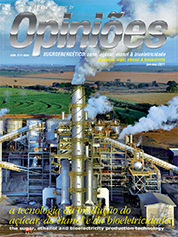Dario Costa Gaeta
President of Paraíso Bioenergia
Op-AA-27
We will never reach the target
When one first thinks about state-of-the-art, what comes to mind is a factory with pioneering technology, in which all parts function perfectly well. This is the overall objective of anyone responsible for a mill’s operation. And yet, I need to state my opinion about this theme, which, in the eyes of some, is contrary to the mainstream. In our day and age, the so desired state-of-the-art is transient, and only occurs with the right people.
In the history of the sugar and ethanol industry, the first “technological” discovery some centuries ago was the use of crushed bagasse of sugarcane to feed furnaces in lieu of wood from cut down forests. This may appear strange, but every Columbus egg seems obvious once it is standing. At that time, it was quite a discovery.
This historical fact illustrates what we are doing today: the obvious. Our industry is essentially contrary to changes. Every new development requires time to take off, not to mention how often an excellent idea falls to the ground upon takeoff. This results in that new technology has a very slow implementation speed. The technology exists and is available.
What it takes is capital to purchase new equipment or systems, for them to be installed in one’s mill. There are mills equipped with the most modern corporate management systems (ERP) or the best production equipment, but the executive board has the feeling that the investment doesn’t “work” properly. Following implementation, there is always the need to adapt the system or technology to achieve the expected results.
So, let us go back to the beginning of the state-of-the-art cycle, which is where all the difference lies: people. Nowadays, we are experiencing the lack of personnel in the sugar and ethanol industry, which will only be overcome in the medium term with much investment in training. This makes us come to the conclusion that we have the capacity to purchase modern technology, but it will most likely reach optimal levels.
When our personnel is trained and ready, the technology will no longer be the same. Thus, we will begin a new cycle. At Usina Paraíso Bioenergia we view the training of our personnel as one of the main pillars of our development. To advance in the market, we know that the best differentiating factor is the qualification of manpower.
This allowed Paraíso to enter into the select group of mills that are building the industry’s future. Another aspect we cannot ignore is the ongoing movement in the industry to use sugarcane juice. I clearly see that in the years to come we will have mills producing electric power, three or four new products derived from sugarcane juice and, as residual products, sugar and ethanol.
That is precisely true: the original sugarcane products, that wrote the industry’s history, will not necessarily be the main actors in the future development. The 1999 crisis made many mills diversify away from ethanol to sugar. The 2008 crises forced all of them to improve debt levels. For some years now we have been into cogeneration that, no doubt, is the best investment that can be made in a mill these days.
With this objective, Paraíso recently celebrated a partnership with Rhodia, one of the largest chemical groups in the world. Under the agreement, we may exploit cogeneration in a broader manner, integrating energy efficiency and improvements to processes.
We believe this is just the beginning. We are in for a true revolution in the industry, in which, in an analogy with the aeronautical industry, we are still attempting to stay in the air for seven minutes, like Santos Dumont, or, if you like, we are still using an XT computer.
I refer to the new molecules as an alternative to improve aggregate value per ton of sugarcane. In my opinion, we are still in the beginning. This revolution is coming and will involve from genetic development of sugarcane to modified yeast in the fermentation of products with high aggregate value. We will experience long-term planning, with mills producing energy and products eleven months a year, if not to say 12 months.
I perceive skepticism in listeners whenever I comment on this possibility in our industry. I come from the chemical industry, in which products are much more corrosive and logistically complicated, on the road 24 hours a day, 365 days a year. In this regard, I am supported by my future partners who think the same way.
Paraíso is finalizing three new partnerships for the road to the future, which will confirm the remarks I am making. This accelerated pace will at all times outdate every single mill. To achieve the state-of-the-art will be a mobile objective, which will always be two steps ahead of us. To consolidate these two thoughts – new technologies sprouting month after month and training our personnel to achieve full utilization of this technology – will be in an upward spiral, in which we will never reach the objective, but will always be making improvements. Day after day.




